Ellen Pompeo, Mariska Hargitay and the Curse of a Successful Primetime Drama
With Good American Family, it's time to finally say goodbye to Meredith Grey
I didn’t want to watch Good American Family, the Hulu miniseries that’s a mix of truth and fiction about a 2010 wayward adoption — one with a legal disclaimer at the beginning of each episode so big that it feels like I might get sued just for watching. It wasn’t because I could probably recite the Wikipedia page on the real-life Natalia Grace case of which the show is based, or because I was obsessed with the movie it’s been compared to, Orphan, back in the day (healthy). It wasn’t even because Ryan Murphy has instilled an innate fear in me of overdramatized true crime television (it’s for the best this newsletter was on hiatus when Monsters: The Lyle and Erik Menendez Story came out…).
It was simply because I didn’t want to see Ellen Pompeo as anyone but Meredith Grey.
Pompeo has been playing the titular Grey’s Anatomy doctor since the show aired back in 2005, the same year Martha Stewart was released from prison, Tom Cruise infamously told Matt Lauer “you don’t even know what Ritalin is” and I found out who Usher was. Initially a surgical intern at Seattle Grace, Meredith rose through the hospital ranks to eventually become chief of surgery (a title that’s been held by what seems like half the show’s characters). We’ve watched her save lives, lose patients, grab a bomb that’s somehow lodged its way into someone’s chest cavity. But as viewers, it was the relationships — her friendship with Sandra Oh’s Dr. Cristina Yang or her love affair with Patrick Dempsey’s Dr. Derek Shepherd — that made us love Meredith Grey. She was a complicated character, both strong willed and vulnerable, traumatized and petty. It’s a compliment to that writers’ room that audiences were able to forgive Meredith for sleeping with George O'Malley seemingly just for the bit when she knew he was in love with her, or being so cruel to the younger half-sister Lexie Grey who wanted to form a sisterhood.
It will probably come to you as no shock that I did not make it to the end of Grey’s Anatomy, which is currently in its 21st season. Like most people I know who at one point loved the show, I found other television to watch as streaming services pushed us to abandon the cable television we had been so loyal to. I think I bowed out respectfully around the time McDreamy died. But it was comforting knowing Pompeo returned to set each year, keeping Meredith alive (a real feat on that show) and working at Seattle Grace, even as most of the characters around her died, quit or left otherwise for “creative differences.” I watched from the sidelines as the actress’ $20 million salary was leaked in 2018, securing her spot as the highest-paid actress on a primetime drama. I was happy at the news that T.R. Knight’s George returned via a dream sequence in 2020 when Meredith was suffering from COVID-19 and needed him. I was relieved when news broke that Pompeo — whose exit seemed somewhat inevitable as the years went on — announced she would be be stepping back from the show, but still returning as a recurring character. “This isn’t your first time on the rollercoaster,” she said at the time. “You know the show must go on and I’ll definitely be back to visit.”
Maybe I should have been prepared to see Pompeo as someone else on my screen, but I wasn’t. Yet here she is every Wednesday, in a vastly different role as Kristine Barnett, who, along with her husband Michael Barnett, was charged in 2019 with neglect of their daughter Natalia, who they adopted in 2010. Kristine’s case has been dismissed, but she will likely never recover from her damaged public image. Natalia, who has a rare type of dwarfism, was first adopted from Ukraine by a family based in New Hampshire, before being adopted by the Barnetts. She was around seven years old at the time, according to her adoption papers, but the Barnetts quickly became suspicious that she was actually an adult. The Barnetts say Natalia snuck into their bedroom brandishing a knife; Natalia says they made that up thanks to inspiration from the 2009 movie Orphan (yes, you read that right. Believe it or not Orphan came FIRST). The Barnetts say Natalia tried to get her adopted brothers killed; Natalia says that never happened. The Barnetts say Natalia was hiding the fact that she had her period; Natalia says “that's crazy.” Roughly two years after first bringing Natalia home, the Barnetts convinced a judge to re-age her, officially making her 22 years old on paper — a move that allowed them to abandon her in an apartment. As you may have guessed, this case is bizarre and I’ve only skimmed the surface; I recommend the Hulu docuseries The Curious Case of Natalia Grace for all the details. In that series, it’s revealed that a DNA test conducted in 2023 by the medical lab TruDiagnostic seemingly confirms that Natalia was in fact a child when she was adopted by the Barnetts, and when they left her in an apartment to fend for herself.
Good American Family is just over halfway through its run, and it’s finally starting to follow through on its promise to share “multiple perspectives” with its latest episode focusing on Natalia’s first few days after being thrown out by the Barnetts. Up until this point, the show has at times made Kristine look like a victim, despite clearly having narcissistic tendencies. At best, she was portrayed as a delusional, bad mother (and not in the fun way), but with this latest episode she’s an intentionally abusive one. That balance is thanks to Pompeo, in her first major role outside of Seattle Grace since Grey’s Anatomy hit the small screen.
And yet despite her giving a good performance, I was constantly distracted during the first episode of Good American Family, fogged with thoughts about how I wasn’t watching Kristine Barnett, I was watching Meredith Grey. Meredith Grey kissing her husband (played by Mark Duplass). Meredith Grey running a daycare. Meredith Grey making breakfast for her sons. It wasn’t until I watched Kristine fawn over her son Jacob, who is a prodigy and has autism, that I finally admitted Pompeo was doing a good acting job. The only trace of Meredith in her was what I was projecting onto her — an admiration that only helped her character gain audience affection even as an underlying tension makes it clear we won’t always be on her side. On the surface, Pompeo plays Kristine like she’s a proud mother of Jacob, but she also hints that Kristine is swept up in how others view her as a good parent, how she feeds off being the hero in Jacob’s story.
Pompeo isn’t the only woman who has become so aligned with a character on television that it’s challenging for viewers to see her as anything but. I have a hard time watching Kerry Washington without immediately feeling like we’re back at the White House, urging her against my better judgement to make out with the president as Olivia Pope in Scandal. And Lauren Graham is always Lorelai Gilmore to me. But this is even more true for another fictional Olivia, and if you’re a loyal reader, you probably know who I’m talking about (sorry)… Detective Olivia Benson.
Mariska Hargitay has played Benson on NBC's Law & Order: Special Victims Unit since 1999. When the Law & Order spinoff first aired, Benson shared most of her screen time with Christopher Meloni’s Detective Elliot Stabler (who now has his own show, Law & Order: Organized Crime, which is apparently already on its fourth season… Dick Wolf, you’ve done it again). Like Meredith Grey, Benson was promoted again and again, and is now, in the show’s 26th season, captain of the Manhattan Special Victims Unit. Because at its best, SVU is much more of a procedural than Grey’s, Benson’s personal life hasn’t had to be a focal point of the show. Still, we’ve seen her date, adopt a son, get kidnapped, get way too close to kissing Stabler whose wife had only just died by the way, and turn from a somewhat reserved detective to the fierce boss.
Unlike Pompeo, who at least now is spreading her wings, Hargitay seems perfectly happy staying exactly in her lane as a member of an elite squad who investigates especially heinous crimes. But both Pompeo and Hargitay have become unusually intertwined with their characters. Hargitay is married to an actor with a recurring role as a defense attorney, she’s an executive producer, she has well-documented friendships with the show’s other actors like Meloni, Kelli Giddish and Ice-T (yes, he’s still there). She’s been confused for a real police officer, and she founded the Joyful Heart Foundation, whose mission is to end sexual assault, domestic violence and child abuse. I watched her speak in San Francisco right around the time her HBO documentary I Am Evidence on the massive backlog of untested rape kits, and felt like I was in the presence of Olivia Benson herself.
Besides both being among the highest-paid TV women at one time, and both appearing in Taylor Swift’s “Bad Blood” music video (Swift has cats named Meredith Grey and Olivia Benson… so if anyone wants to send her this newsletter…), Pompeo and Hargitay have followed a similar path. Both are clearly talented, with early roles that show they probably could have had movie careers — Pompeo was in Catch Me If You Can with Leonardo DiCaprio, and Hargitay had a small role in the pilot of Seinfeld, for example. But since the early aughts, they’ve been a doctor and a detective to me.
And despite loving them for that, I’ve also judged them for it. Hollywood rewards actors who display range, and as a result, so have I. Emma Stone, one of the most celebrated actors of our time got to be that way by using her sassy high school character in Easy A as a launchpad into “serious acting,” eventually culminating into two academy awards: one for her role as an aspiring actress in Los Angeles and another for a Frankenstein-inspired character with a toddler’s brain. The only thing A Complete Unknown, Wonka, and Dune have in common are Timothée Chalamet — and the fact that I unfortunately couldn’t care less about any of those movies — but you know having them all on his IMDB is going to snag him a little gold man one day. Even though nowadays it's respectable for movie stars or indie darlings to cross over into television, this is more the case for dramatic miniseries or anthology shows like White Lotus, True Detective or Black Mirror, not the cable staples we know and love. Because at the end of the day, it's all about range. And when an actor plays the same character for more than 20 seasons, unless they're Nina Dobrev playing four deranged girlies in one on The Vampire Diaries, it's hard to picture that range even if they really do have it in their repertoire.
That’s especially the case when you compare their careers to those of actors who have transcended their long-running TV personas. Take Gillian Anderson, who shed her FBI Special Agent Dana Scully skin from The X Files to become known as sex therapist and mom Jean Milburn in Sex Education or Margaret Thatcher on The Crown. It doesn’t feel like you’re back in the 90s watching Elaine from Seinfeld when you turn on Veep, or Breaking Bad’s Walter White when you watch Bryan Cranston1 in Your Honor. Even Pompeo’s costar Sandra Oh, who stole every Grey’s scene she was in as Cristina Yang, shed all traces of the character in her Killing Eve performance.
But being tied up in a role for as long as Pompeo and Hargitay have not only makes it hard to shed the associations we have with them and their long-standing characters, but it also influences how we think of them as actors. Staying on a show for that long without many (if any) forays into other media lessens the appearance of ambition, something we weirdly value in actors. Pompeo and Hargitay haven’t publicly yearned for the next best role. They haven’t sought awards or red carpets the same as their peers. Pompeo hasn’t even been nominated for an Emmy, something that the “you don’t get to call me a whore” monologue alone should have nabbed her. In a recent episode of the Call Her Daddy podcast, Pompeo addressed why.
“If I’ve been a part of something that brings people together, then that sort of legitimizes it for me. Because as an artist, it isn’t the most normal path,” Pompeo said. “It makes me feel like I’ve really done something, as commercial as it is and perhaps as uncreative as it may be for my field. I’ve touched a lot of people, moved a lot of people and inspired a lot of people, and that’s more than a lot of people in this business can say.”
She’s been very active in her children’s home life, an option that wouldn’t have been made available to her if she had pursued the more creative path. And of course, there’s the money.
So there are good reasons that Pompeo has portrayed Meredith for so long, despite having the chops to take her skills elsewhere. And despite drawing conclusions about Pompeo’s career because she stayed at Grey’s for so long, I also didn’t want to see her elsewhere. In fact, while I’d like to think I couldn’t separate Pompeo from Meredith while watching Good American Family, I actually believe it was more about my unwillingness to. It’s been acceptable to watch Pompeo and Hargitay age on their long-running series because it’s been on the terms of those shows. Their growing older was in the best interest of the stories — it allowed for character development, and offered a sun for the rest of the characters and storylines to orbit around for years, for decades. But seeing Pompeo, now 55, in a role that hadn’t been a familiar part of my childhood was jarring. It showed that time was passing, that I was growing older too.
In essence, I have been putting two actresses whose characters have helped me grow up into a box, asking more of them than possible, as we’re known to do with women in the public eye. I want them to learn and grow, but not too quickly. To step out of their comfort zones, but not too much. To show range, but stay exactly the same. It’s what society has done to women for centuries — an internalized misogyny I thought I was above, and one that Pompeo, Hargitay and both their characters have actively fought against.
There’s a scene in Good American Family in which you can see the tenderness Meredith has with patients perk up in Pompeo’s portrayal of Kristine Barnett. It’s when the Barnetts both meet Natalia, when there’s not yet a dark cloud over all their interactions. They’re all just basking in the future’s potential. Kristine seems excited to grow her family and to take Natalia under her wing. But as soon as the exterior begins to crack when Natalia disobeys her, something far more sinister than Meredith Grey starts to show in Kristine. It felt like, after spending 20 years in a pretend hospital on ABC, Pompeo was starting to show her range. Or maybe I was just starting to accept it.
B Plot
What’s a movie, like Orphan, that had a chokehold on your childhood for noooo good reason?
Mallika: Easily The Stepford Wives. This was when I really thought Matthew Broderick and I were soul mates, but that’s another story. We shall never know why I was so devoted to a movie about a bunch of incel-like husbands who get mad their wives have jobs or something and turn them into robots. But Nicole Kidman, Glenn Close, Christopher Walken and Bette Midler… you can’t say I didn’t have taste. And that twist ending?! All I’ll say is perhaps we could have put Glenn out of the misery of losing eight Oscars if we had just given her one for that scene alone. The most important part of this film is of course when White Lotus creator Mike White appears for one scene, pulls a gun on Nicole Kidman’s character and says “I have an idea for a new show — it’s called ‘Let’s kill all the women.’” Well, you did that, didn’t you, Mike.
Rachel: This is such a hard question because the number of movies I had no business watching as a child that have shaped my whole existence is vast. Tell me why Moulin Rouge and Garden State2 were my go-to watches in the third grade! My first email account was beatlesluver08@yahoo.com solely because I was constantly sallivating over Jim Sturgess cooing Something in the way she moves… in Across the Universe. And I’m actually so ready to unlock this persona again when Paul Mescal takes up the mantle. But one of the most absurd films that had me in an absolute chokehold was the 2005 blockbuster hit Elizabethtown. Ultimately this movie, starring Orlando Bloom and my Victorian mother Kirsten Dunst bringing the manic pixie dream girl trope to new heights, is just reheated Garden State nachos. But the first two scenes are a fever dream that still to this day live rent free in my head. There’s a corporate implosion prompted by Orlando Bloom’s tennis shoe design that went so horribly wrong “it may actually cause an entire generation of people to return to bare feet.” The Feds show up, Alec Baldwin has to flee on a helicopter, and then Orlando Bloom turns his eliptical into a suicide machine ??? This was a rom com! Susan Surandon and Judy Greer are also involved. And Mark Brendanawicz from Parks and Rec sings Freebird. Typing all of this out, it actually makes perfect sense why this movie left an impact.
C Plot
If there’s a fictionalized version of a true crime story on Hulu, you know we will be watching and overanalyzing (see above and Under the Bridge). So you can bet we’re ready for one on the Murdaugh murders starring Brittany Snow, Patricia Arquette as and Succession’s J. Smith-Cameron, and co-created by Erin Lee Carr, best known for documentaries on Gypsy Rose Blanchard and Britney Spears (and maybe less known for Fanatical: The Catfishing of Tegan and Sara, which everyone should watch). Action star Jason Clarke (White House Down, Zero Dark Thirty…. boy movies that are simply none of our business) is currently cast as Alex Murdaugh, the high-pitched North Carolinan murdering lawyer and father at the center of the scandal, and to that, Rachel says, you will RUE the day you didn’t cast Jack Coleman, Hulu! Rue it! Was his turn as Noah Bennett in Heroes or Bill Forbes in The Vampire Diaries not ENOUGH to show you people Coleman can play a nefarious father like no other?? And the resemblence is uncanny! Get that man off Chicago P.D. and get him the Emmy he deserves! If we didn’t love Patricia and Britney so much, we’d be rooting for the show’s downfall via a higher-budget HBO copycat series a la Candy/Love & Death.
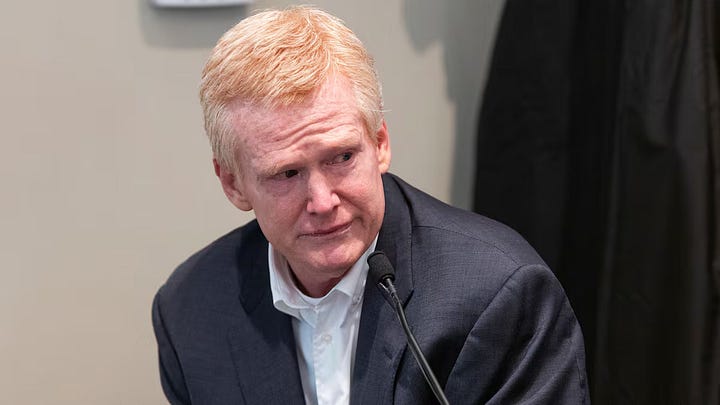
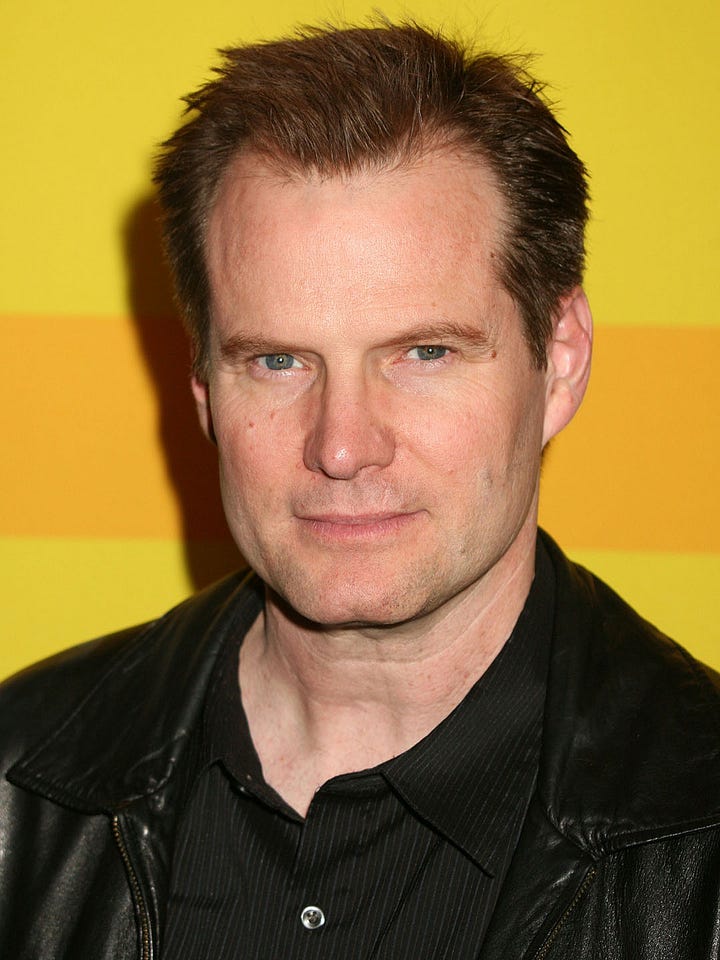
Sometimes we’re a little nosy, and sometimes we would literally chop off an arm to know why Walton Goggins and Aimee Lou Wood from the most recent season of The White Lotus are feuding. But we don’t have to guess why creator Mike White and the show’s composer Cristóbal Tapia de Veer are beefing. They’re both telling us all about it after Tapia de Veer quit the show and essentially called White a diva right before the finale, which White later called “a bitch move.” Boys…. let’s work it out on the remix!
We’ll write more about the state of White Lotus next NL so stay tuned… but we have to say, White is acting like JK Rowling with all the lore he’s dropping that got cut from the season. Carrie Coon’s daughter was trans? Piper and Zion had sex?? Kate, with that bob, had a Lynchian nightmare about ping pong?? Zach Snyder cut! Now!
And finally, if there’s one thing BBC is going to do it’s make a new Pride and Prejudice adaption. This time, Emma Corrin (The Crown, Nosferatu) is our Elizabeth Bennett and Jack Lowden (Slow Horses, but really just Saoirse Ronan’s boyfriend) will be Mr. Darcy. To cast a naturally blonde man as Darcy is… we’ll say it… groundbreaking. While Lowden can be convincingly stodgy, he’s not who we’d peg to fill the shoes of Colin Firth or Matthew Mcfadyen, but he IS partnered to a real life Elizabeth Bennett in Ronan so we will give him a chance…
And it didn’t feel like you were watching Hal Cleaver from Malcolm in the Middle when you watched Cranston on Breaking Bad…. his range
It’s just now occurring to me that one of these movies was many a man’s gay awakening and one is of the most sickeningly heterosexual films of all time…. much to unpack here. I’m feeling like Florence Pugh could help…

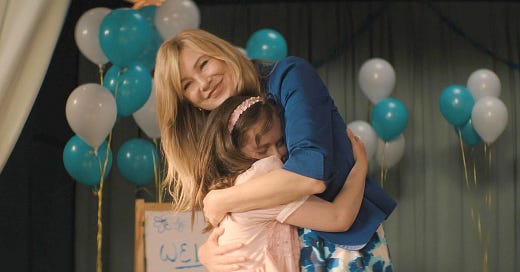




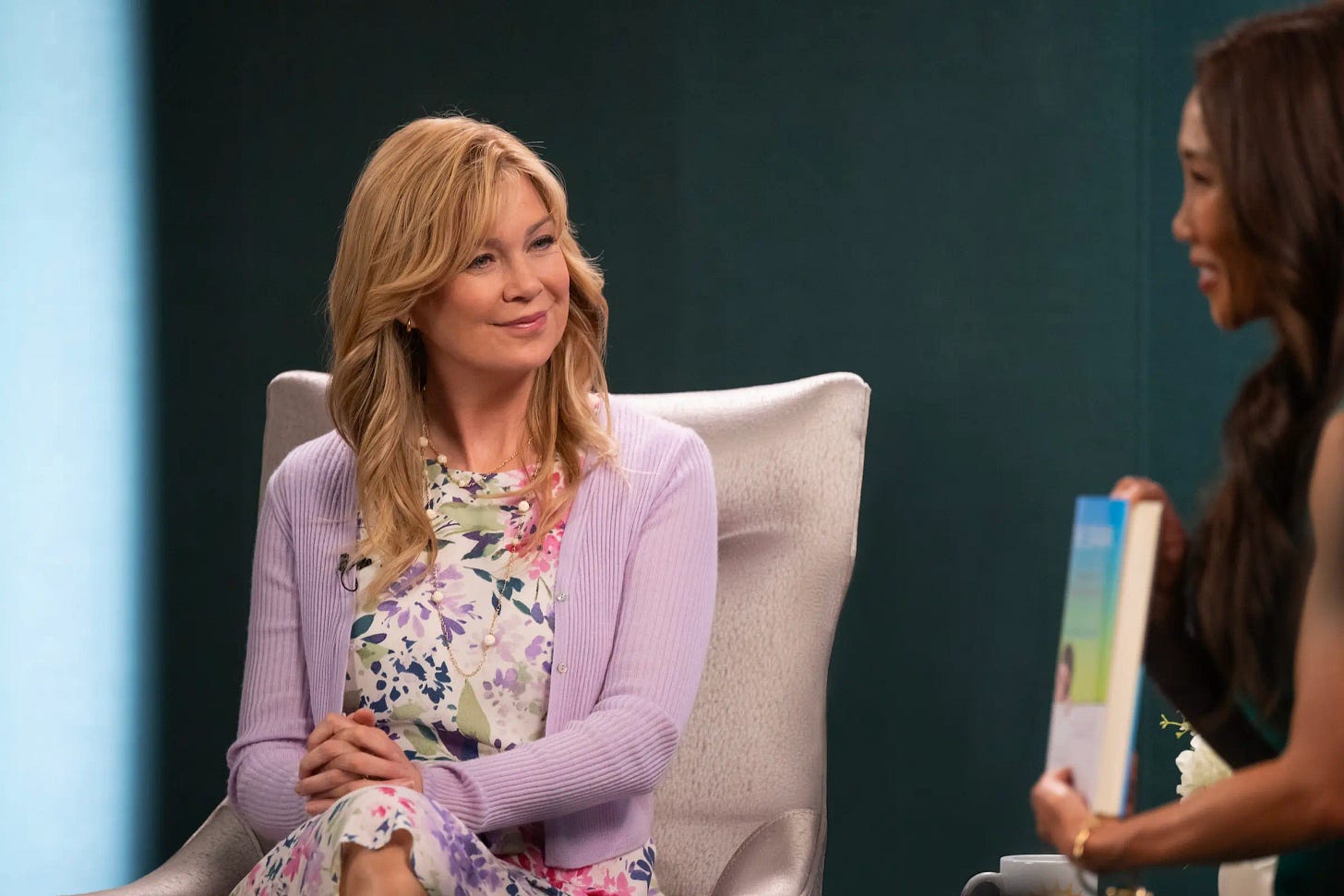


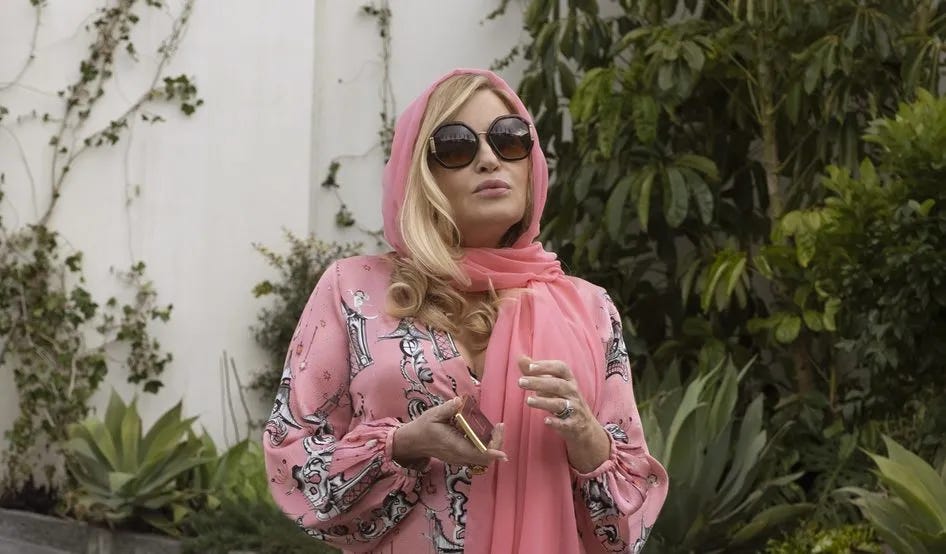
Mike White is out there giving us a completely different season of White Lotus with all the things they had to cut 😂. I would watch the director cut on this for sure!